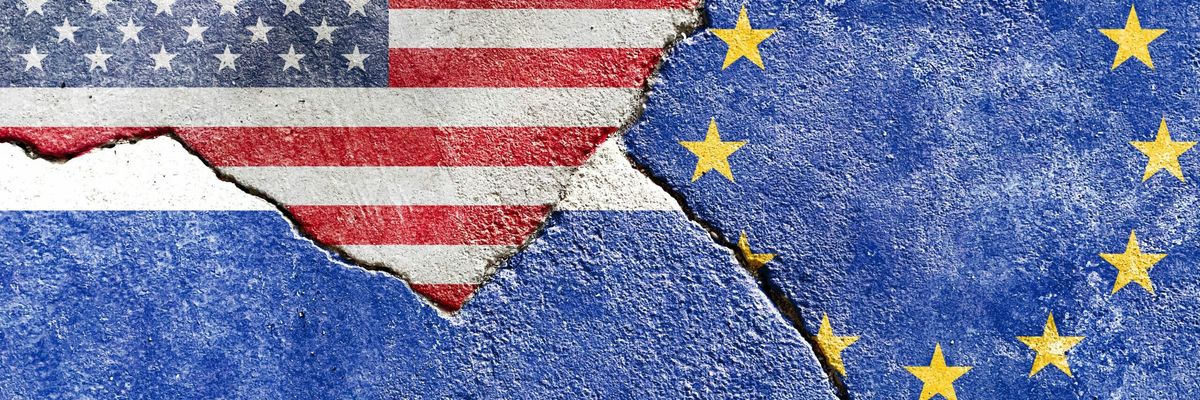As the United States tries to cope with the crisis in Ukraine, missing so far is a clear sense of “what next?” — that is, once the current imbroglio is over, as inevitably it must be.
As Vladimir Putin continues to keep the West and the world in suspense about his intentions, at least one thing is clear: there will be no going back to the status quo ante. Even if Mr. Putin decides that he has made his point and would like to deescalate, the character of security and other arrangements in Europe will be different from what they were before this crisis.
Russia will henceforth be a “player,” certainly in Europe, to a degree it has not been since the collapse of the Soviet Union 30 years ago or at least since the West, in particular the United States, stopped taking seriously legitimate Russian security interests around 1998. For nine years before that, there was a serious attempt to create what George H.W. Bush had called, and Bill Clinton also pursued, a “Europe whole and free” and at peace. From then on, after those U.S. officials who understood the demands of trying to make this grand strategy work had left government, the default position became that, as the “sole superpower,” the United States (along with NATO) could do what it wanted in Europe and Russia be damned.
Looking at what has happened this past year, no one can say that Putin didn’t give fair warning, as early as his presentation in January 2007 at the Munich Security Conference (attended by this author), when he excoriated Washington for trying to have everything its own way. He was ignored. Russia was further ignored when, in 2008, NATO declared that Ukraine and Georgia “will become members of NATO,” not because the allies believed it — they didn’t — but rather to deal with a major misstep by the G.W. Bush administration in its desire to enlarge NATO well beyond what could be needed for Western security.
Now, with Russia’s military power built back up, and despite the weakness of its economy compared even to some West European economies, much less those of China and the United States, Putin has been saying in effect: “Enough is enough. Now you have to take both me and my country seriously.”
Ukraine is where Putin chose to make his stand, and, from his perspective, he chose wisely. It has been clear to everyone for a quarter of a century that Ukraine would never get the unanimous support it would need, now or ever, to join NATO, and also that the United States has zero intentions of defending Ukraine militarily, come what may. Indeed, while the NATO Treaty has requirements in the event of aggression, there is nothing to limit military action in defense of any country. Correctly, however, Biden has repeatedly made clear that defending Ukraine is not worth the life of a single U.S. soldier, just as G.W. Bush made clear regarding Georgia during the brief Russian-Georgian conflict in 2008.
This is a central lesson, which could hardly be lost on anyone. Paradoxically, it is evidenced by the Biden administration’s continual prediction that a Russian invasion is right around the corner — aided by the hyperactive U.S. mainstream media and a host of military-fixated U.S. “experts” — and reiteration that, if Russia does invade, it will be subject to drastic economic sanctions. “Economic sanctions?” When major powers have something important at stake for their security, sanctions simply don’t work. And even here, the Biden administration has not been able to line up all the NATO allies — notably this week when the new German Chancellor, Olaf Scholz, stopped short of endorsing Biden’s threat to put the Nordstream II gas pipeline on the list of potential sanctions.
So, what is to be done? The tactics of the current crisis will continue to play out, until Putin decides that he has stressed the West enough (and perhaps has sowed the seeds of further tensions within the democratic West) and thus can lessen the pressure, perhaps for some face-saving tradeoffs. (He would be crazy to invade Ukraine and crazy, decidedly, he is not.) In order to hasten that day, NATO should get off its obsession with the so-called “principle” of an open door to NATO membership, not just for Ukraine (and Georgia) — which will never happen — but potentially other states. The fact is that, even without Putin’s calling for it, there are no other serious countries on any potential waiting list to join NATO. The principle is thus getting in the way of practical needs, and Putin is laughing up his sleeve.
So, leaving aside tactics for the next period, the future beyond the crisis must be considered — and now, not later. A key requirement is to recognize that the time is past when the United States and other Western countries could call almost all the shots in European security and when Russia is considered a secondary player; indeed, not just in Europe but in other areas, notably the Middle East as well. Further, the time of American exceptionalism, which only began with Pearl Harbor, is also over. The United States will henceforth have to behave like a “normal” country, though, in most elements of power and influence, still primus inter pares. At the same time, Putin also cannot ignore some stark realities, despite all the attention he has been getting lately. Thus, unless Russia is willing to risk becoming a big loser in the sweepstakes of economic development and political influence, it will also have to moderate its ambitions, especially imperial, and accept becoming “normal.” For Russia, the true challenge is the European Union, not NATO.
The actual architecture of change is not clear, although a plethora of practical first steps, nestling under the rubric of “confidence building measures,” is already on the table. And the West does have some real red lines (unlike the impediment of the open door principle), notably the continued existence of NATO — where Russia already has some formal links — and America’s role as a European power. But beyond that, there is much to be considered, analyzed, debated, and negotiated, most likely in pieces, not all at once, and not in any grand bargain.
After what Putin has done since at least the 2014 invasion of Ukraine and whatever considerations of power may counsel, building a basis for Western confidence that Russia will play a responsible and not a wrecker’s role in European security will take years of practical steps and political demonstration. One element of trying to bring Russia into the outside world without threatening its neighbors is to promote its economic integration in the West to a degree far greater than ever before. Indeed, for decades objective analysis has indicated that Russia has more to lose from being isolated from the Western (and hence global) economy than from any challenge that NATO could possibly pose.
Getting from here to there will, on the Western side, first depend on a degree and intensity of strategic analysis that has confounded the last several administrations and continues to confound this one. On the Russian side, Putin will need to start by understanding that he has reached the limits of his “territorial ambitions in Europe,” as he clearly has. Even owning all of Ukraine could not substitute for long-term isolation from Western-fostered reforms and engagement on which the Russian economy and hence social advance will perforce depend.
This logic does not guarantee that leaders will get right their own national interests. It will require a lot of realistic rather than romantic thinking, hard work, and demonstration on all sides both mutual respect and understanding of the facts of political power, beginning in Europe, which has been missing since about 1998. We can only hope that it will be possible to get right this time what was gotten wrong — on both sides — a quarter century ago, thus leading toward the building of a Europe truly whole and free and at peace. That has to include a serious place for a fully respected and consequential Russia, as significant actor, not afterthought, provided it is prepared fully to respect and to act toward others in the only ways that can make sense for its own future.















